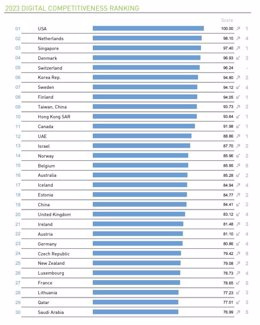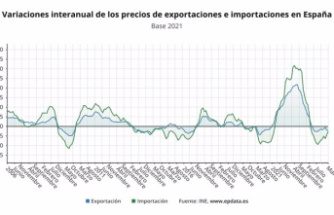MADRID, 30 Nov. (EUROPA PRESS) -
Spain has dropped three places in the 'Digital Competitiveness Ranking' prepared by the IMD (Institute for Management Development) business school, which analyzes the degree of digital adoption and preparation of 64 economies, going from 28th place in 2022 to 31, while the United States has recovered the first position.
Spain's fall is due to its worse performance in one of the three key indicators of the study, specifically, 'preparedness for the future', in which it falls from 27th to 29th place.
The director of the IMD World Competitiveness Center, Arturo Bris, considers that although Spain has dropped in this classification, the country has evolved in specific aspects, such as the creation of digital companies or the digital passport, elements that this edition of the ' ranking' does not yet include because it mainly uses data from 2022, he explained.
However, he recognizes that "the improvement expected by the application of the European Next Generation funds has not yet occurred", which in his opinion "should promote the transformation of digital culture" in the country.
Furthermore, he pointed out that "the political and social debate should focus on recognizing and valuing the productivity of companies and professionals, instead of betting on measures that may impact their competitiveness, such as reducing the working day," he added.
The authors of the classification have also highlighted that among the criteria that compromise Spain's performance - and that the analysis considers weaknesses, they clarify - include the use of 'big data' and analytics (58th place on the list), the legislation related to scientific research (54), knowledge transfer (44), the percentage of high-tech exports (43) and the number of science graduates (43).
On the other hand, Spain has improved in the other key indicators of the ranking since it has gone from 33rd to 31st place in the technology factor, and from 27th to 26th in the knowledge factor.
The best-valued economies in this year's ranking are the United States, the Netherlands and Singapore, which according to the authors belong to what "can be considered 'digital nations'", that is, countries that facilitate the full adoption of technologies. digital by governments, companies and individuals.
"Although we do not measure specific indicators of artificial intelligence (AI), this technology is quietly at the center of several of the sub-factors we quantify: talent, regulatory and technological frameworks, adaptive attitudes and business agility," explained Bris IMD.
Along those lines, AI and national security concerns are at the center of another "notable trend" observed in the study, specifically, the growing attention to cybersecurity.
"Cybersecurity becomes a clear example of the need to evaluate the advantages and disadvantages of AI and to take a very deliberate approach to using it in the best way. Countries cannot do it in isolation, they need to rely on regional institutions or even world championships for it," added Bris.
The United States regained first place on the list after falling to second place for the first time since the Digital Competitiveness ranking was created in 2017 due to "solid results" in the factors knowledge, technology and preparation for the future.
"Similar consistency is found in the Netherlands, which has risen four places and is in second position, closely followed by Singapore, which occupies first place in the technology factor," added IMD.
Meanwhile, Denmark (which led the 2022 edition) fell to fourth place due to its worst performance in the future readiness and technology factors, while Switzerland, the best-ranked economy in the knowledge factor, maintained its position and completed the 'top 5'.
The three main factors analyzed in the study (knowledge, technology and preparation for the future) encompass nine sub-factors that comprise a total of 54 criteria quantified through a combination of concrete data and survey responses from senior executives in each country analyzed.













